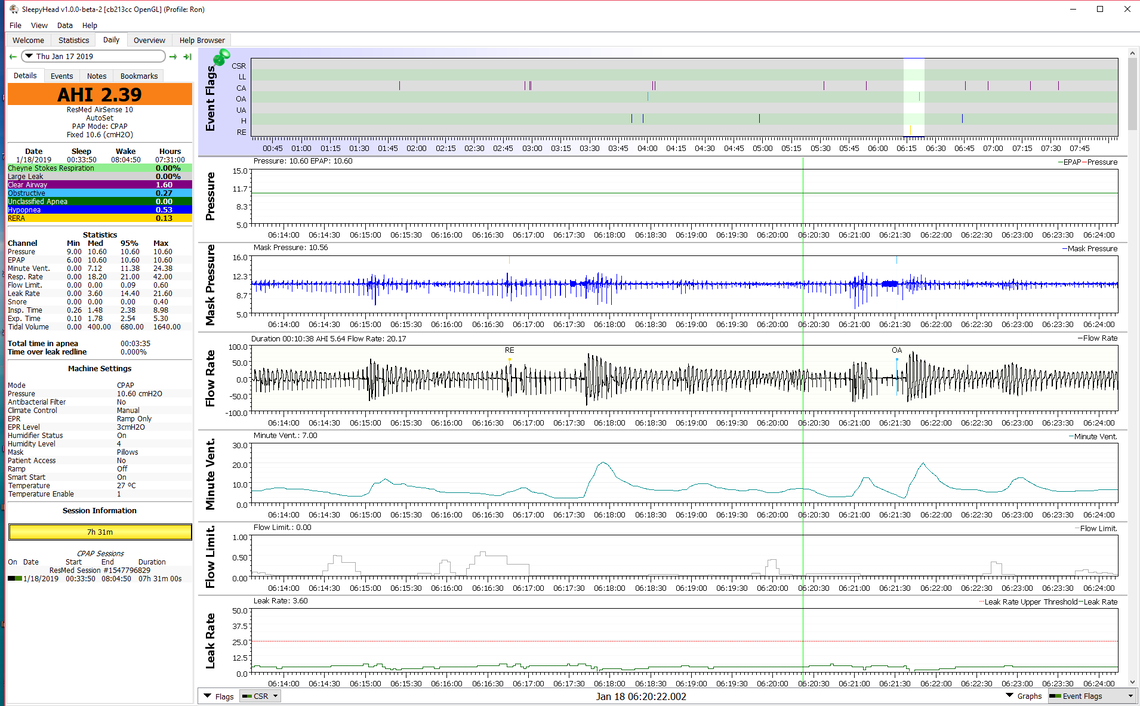I have an appointment to pick up an oximeter and take a one night measurement.
Is this extra cost worth the hassle, or am I better off just relying on my sleepyhead data and AHI ? Or perhaps just buy my own oximeter ?
I admit I am "burned out" by the medical provider rigmarole (takes two months to get an appointment, plus not sure I'm getting best advice), hassling with the DME (who I have to actively nag to get to respond), with all the additional hoops I am jumping through to get my auto CPAP and mask working correctly. ARGH !
Thanks for any feedback !
The medical community tends to discount consumer add-ons. That said the general rule that a CPAP doesn't need an oximeter. That assumes that your sleep lab studies, in particular your titration study, did not show significant Desats. Medicare's rule for Oxygen supplementation is at or less than 88% Oxygen saturation for 5 minutes overnight. Some Oximeters are compatible with Sleepyhead. If your symptoms are such that they indicate that you may be suffering from hypoxia I would want to monitor that stat. I have recommended individuals do so to demonstrate an issue to raise with their doctor.
This is something I was just wondering about. Sleepyhead doesn't have the ability to show oxygen levels unless you add an oximeter, correct? I would like to do a one-2 night study but since I no longer have a sleep doctor in my area that insurance will pay for, that probably won't happen. However, I guess I need to find one or I can't get new CPAP supplies either. It's like trying to swim through quicksand.
Ruby, you are in the US and you seem like someone who takes charge of their own care. You do not "need" a Sleep Doctor unless you discover some specific issue where you need a specialist and then you likely need a specialist sleep doctor covering a specific issue. Your family doctor, even your dentist can cover you for the basics easily, just ask them.
Fred
If you click on the Oximetery Wizard Icon in SleepyHead it will give you a list of meters that are compatible with SleepyHead. I don't think they are that expensive. There is one thing you can do with SleepyHead that gives you a bit of a proxy for oxygen in your bloodstream. That is to use the graph titled Minute Ventilation. Ideally when you are sleeping this value which is a measure of the air (and oxygen) you are moving on a mass basis into and out of your lungs, is constant. Assuming your lungs are working well, it can reflect the amount of oxygen in the blood. The levels are probably delayed in following the Minute Ventilation value. Here is an example from my data which includes a RERA event and a full obstructive apnea. The interesting part is that the Minute Ventilation dip is more sustained for the RERA than it is for the OA. RERA does not count in the AHI. For that reason AHI does not always tell you the whole story. This said, I have not used an O2 meter, other than during my sleep study, and can't really say for sure how closely it may follow Minute Ventilation. But you have this data already and it is just a matter of looking at it. O2 may not tell you much more.

I wanted to be able to check Oxygen and Blood Pressure from time to time.
So I bought one of these.
I know there is a fixation here with Sleepyhead software and this device may incorporate into that software or it may not.
But it doesn't matter to me because I don't want a mass of data to figure out or complex patterns to study.
I just want to be able to check a few things from time to time no matter where I am or what I am doing.
For me the Oxygen turned out to be fine but my Blood Pressure has been going down steadily over the past few months and I don't know why.
I stopped taking my blood pressure medication and it just kept dropping. It doesn't make a lot of sense but I'll get it figured eventually I suppose.
I have OSA. I have been using CPAP for years.
I have had chronic breathing issues since my teen years and recently learned that I needed a device showing my O2 and pulse.
I bought a pulse oximeter on Amazon for about $30 which is serving me well.
Several of my doctors seem glad that I have one.
The doctor at my last incident told me that if my rate went below 90 I needed to check in to the Emergency room.
It, and the simple plastic flow meter I got at my last incident give me data that seems to match with how I perceive my breathing.